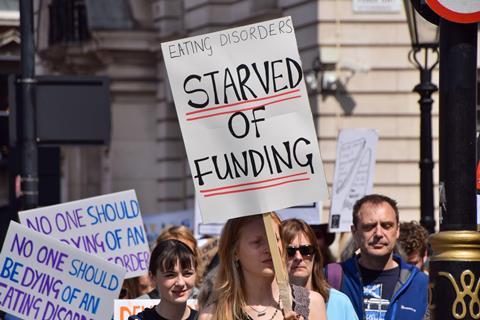Hope Virgo, Founder of #DumpTheScales explains why her experience and her faith propel her to lobby the UK Government to change the way people are being treated.

Tomorrow, on the 27th April we will be hosting the second ever #DumpTheScales march in central London. Walking from Trafalgar Square to Old Palace Yard to make a stand against the injustices every single person affected by eating disorders faces.
When I look at the state of eating disorder services right now my heart breaks in so many ways. When I look at how society is treating people with eating disorders and the huge amounts of stigma my heart breaks even more. We have an eating disorder epidemic on our hands across the whole of society and it isn’t going away. In fact, it won’t go away unless we drastically change the way people are being treated.
For too long eating disorders have not had the support they need, so we must create as much noise as possible to make society and the Government stand up and listen.
For too long eating disorders have not had the support they need, so we must create as much noise as possible to make society and the Government stand up and listen. In 2023, we hosted the first ever eating disorders march but eating disorder services and treatment has not got better. Over the last year we have seen more and more people being moved on to palliative care pathways and being marked as untreatable. No one with an eating disorder is untreatable.
No one with an eating disorder is untreatable.
I am angered at the lack of treatment out there for people who need it, frustrated for people like myself who have never had evidence based treatment and had to learn how to get to a better space, to recover on our own, I hate how people are being treated. How we have people begging for treatment, people begging to not die, but yet services can’t give them what they need. There are moments when I feel huge sadness for what my life could have been. A sadness for carers who have been told they are a bad carer because of their illness. There are times when I feel a huge sadness for all those, like me, who have felt wrong in so many ways in life. Who have felt ashamed for what they have been through, who have been branded as too complex or difficult.
My story isn’t a unique story, but the lack of good quality treatment and people being turned away from services is something I hear daily.
Joss Walden, Assistant Psychologist in Adult Eating Disorders Services and Ambassador for BEAT (UK’s leading eating disorder charity), joined the march last year and is encouraging NHS staff with lived or professional experience to get involved: ’The march last year saw hundreds of people with professional and/or personal experiences with eating disorders join forces to raise awareness about the devastating consequences the current demand on services is having, and to campaign for improved funding and equitable access to treatment. This includes acknowledging that around 90% of people with anorexia do not present as severely underweight and that many people as a result have been denied early intervention, or worse told their BMI must be lower before they can access services.
’I am privileged to be in the position where I can say I am one of the 50% of eating disorder sufferers who has gone on to fully recover and it is an honour to now work within services supporting others recovery. However, this is partly due to my families privileged position having self-funded me years of private therapy and a post-code that enabled me to access multiple streams of support. Whilst I believe everyone can make a full recovery the access to treatment isn’t equitable. Only 30% of people improve and more consequently 20% remain in a chronic condition. This high figure highlights the serious issues with regards to holistic and available treatment.’
Despite their high prevalence, eating disorders are frequently stigmatised and viewed as a lifestyle choice, a phase that only affects white, underweight teenage girls who ultimately grow out of their illness. This myth may underlie the severe underfunding of adult eating disorder services and also the sheer lack of understanding on a wider societal level. In fact, people of all ages, sizes, genders, and ethnicities are affected by eating disorders.
Read more on eating disorders
‘My friend has an eating disorder – why can’t she just snap out of it and eat normally?’
‘Being pregnant with an eating disorder can feel like a minefield’
Ten practical ways to support a child with an eating disorder as they go back to school
GB Athlete, Marilyn Okoro who has had her own lived experience of an eating disorder will be speaking at the march. She told me; “I’m marching because I believe there is strength in numbers and I want to use my voice, platform and above all experience to help others feel seen and heard. I am marching because I believe that after loving God the second most important things we are called to do as Christians is to love others and treat them as you wish to be! The fact that there are people dying due to not receiving the support they deserve breaks me, so I pray our physical presence on the streets of London allows the Government to take ED support and provision seriously.”
The #DumpTheScales march is a chance for everyone who cares about eating disorders to come together and demand action.
The march is taking place on Saturday 27 April 2024, meeting at 10.30am at Trafalgar Square. Speakers include; Presenter Rachael Dowie, Icon and Influencer Megan Jayne Crabb, Marilyn Okoro, Dr Chuks, Campaigner and Write James Downs, John McDonnell MP, Dr Rosena Khan MP and Baroness Parminter
If any of these issues have affected you, you can call Premier Lifeline for support. Premier Lifeline is a national, confidential helpline offering a listening ear, emotional and spiritual support from a Christian perspective. If you would like someone to talk with and pray for you, call Premier Lifeline on 0300 111 0101.































No comments yet